Thursday’s Democratic presidential primary debate was the longest of the year, but several topics that voters have deemed priorities went untouched.
Although nearly 100% of Democrats responded to a recent CNN poll saying they felt aggressive action against climate change was important to them, only seven minutes were devoted to the topic. And despite recent bills limiting the access to abortion being signed into law in nine states, ABC moderators didn’t ask any of the candidates what they’d do to secure the procedure nationwide.
Instead, the hosts followed suit from the previous debates and carved out several early minutes for the candidates to clash over semantic differences in their health-care policy proposals.
Former Vice President Joe Biden was quick to take the bait. Early in the night, he criticized Sen. Elizabeth Warren for supporting a more progressive Medicare-for-All health-care plan, first proposed by Sen. Bernie Sanders. “I know that the senator says she’s for Bernie. Well I’m for Barack. I think Obamacare worked,” Biden said.
Warren praised President Barack Obama’s efforts, but added that the next president should move the needle forward. “We all owe a huge debt to President Obama, who fundamentally transformed healthcare in America,” she said. “Now the question is: How best can we improve on it?”
Former Housing Secretary Julián Castro also hopped into the discussion to accuse Biden of forgetting specifics of his proposal. “Are you forgetting what you said two minutes ago? Are you forgetting already what you said just two minutes ago? I can’t believe that you said two minutes ago that they had to buy in, and now you’re saying they don’t have to buy in,” Castro said.
The debate took place in Houston, Texas at Texas Southern University, a public, historically black university. The Democratic National Committee had announced that if more than 10 candidates met the polling and fundraising thresholds by the deadline of Aug. 28 it would extend the debate to a second night. But despite efforts from candidates who were close to qualifying, only 10 made it and the debate became officially one-night for the first time.
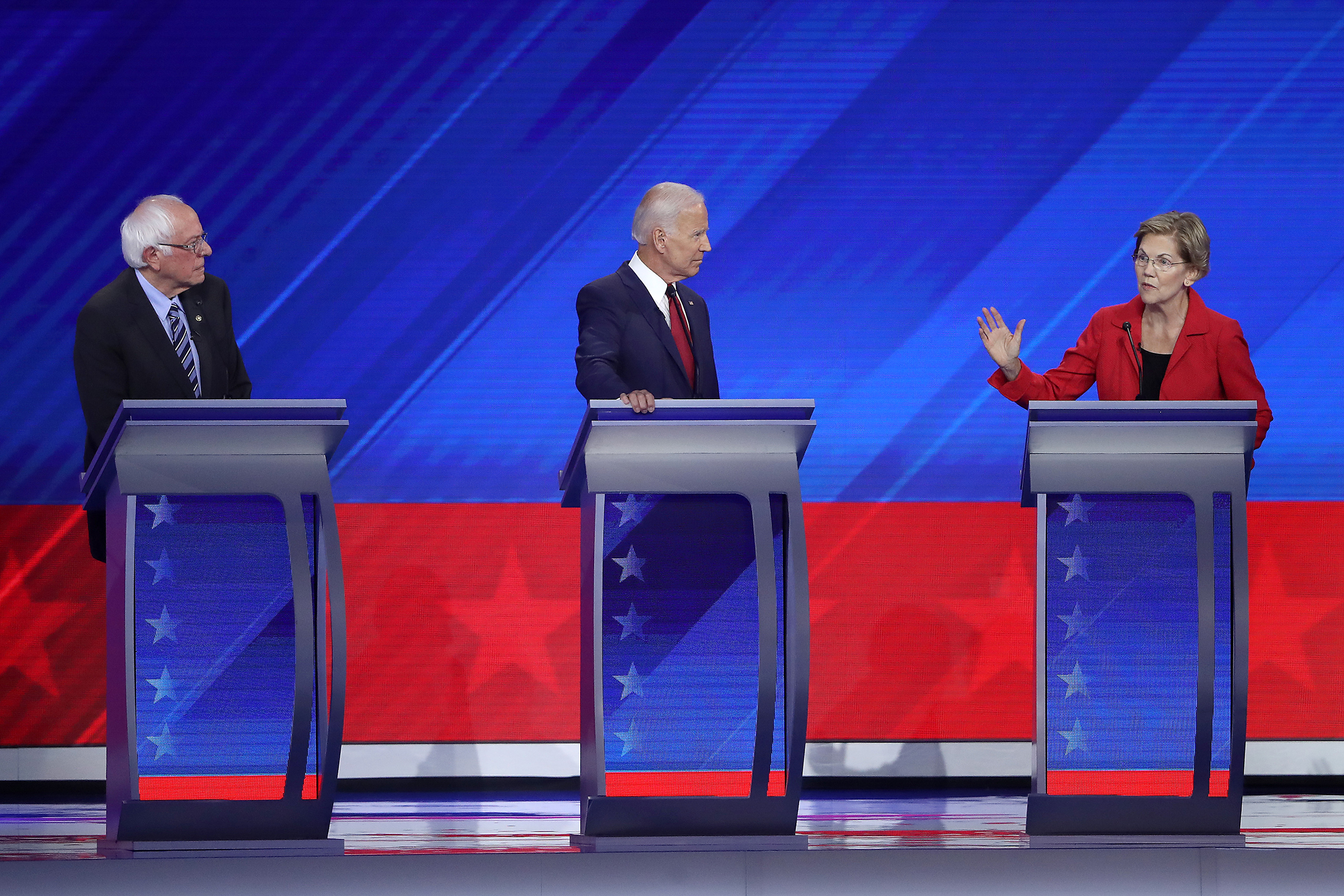
Four people moderated Thursday’s debate: ABC News Chief Anchor George Stephanopoulos, ABC News World News Tonight Anchor and Managing Editor David Muir, ABC News Correspondent Linsey Davis and Univision Anchor Jorge Ramos.
The candidates had more time than they’ve had previously: each candidate has one minute and 15 seconds to directly respond to questions from moderators and 45 seconds to respond to follow-up questions and rebuttals. They gave opening statements, but will not give closing statements.
As campaigns had last-minute chats about the debate and its rules, at least two candidates were reminded by aides that ABC was taking the event live, with no tape delay, meaning the network lacked an ability to bleep any profanity.
Here are highlights from the September Democratic Debate in Houston.
Biden hits Warren on Medicare for All
In the first question of the night, moderator George Stephanopolous pointed out the ideological differences between Former Vice President Joe Biden and the senators on either side of him: Warren and Sanders. Stephanopolous asked if the senators were going “too far” with their progressive proposals, such as Medicare for All. When responding, Biden said “it’ll be for the voters to decide.”
He then took an initial swipe at Warren as he gestured toward her, saying, “I know the senator says she’s for Bernie. Well, I’m for Barack. I think the Obamacare worked.”
Biden also questioned the price tag associated with their healthcare proposals, adding, “The senator on my left has not indicated how she pays for it.”
Warren responded “that we all owe a huge debt to President Obama who fundamentally transferred healthcare in America.” She later said, “now the question is how best can we improve on it.”
Warren also said that under Medicare for All “costs are going to go up for wealthier individuals and costs are going to go up for giant corporations.” She later added “but for hardworking families across this country, costs are going to go down.”
Castro vs. Biden
Juliàn Castro and Joe Biden both worked closely with President Barack Obama as the Housing and Urban Development Secretary and Vice President, respectively. That’s what made their back-and-forth over their former boss’ healthcare plan that much more dramatic.
“I’m fulfilling the legacy of Barack Obama, and you’re not,” Castro bluntly told Biden, adding that his own plan for a public healthcare option better fulfilled the initial intentions of Obamacare.
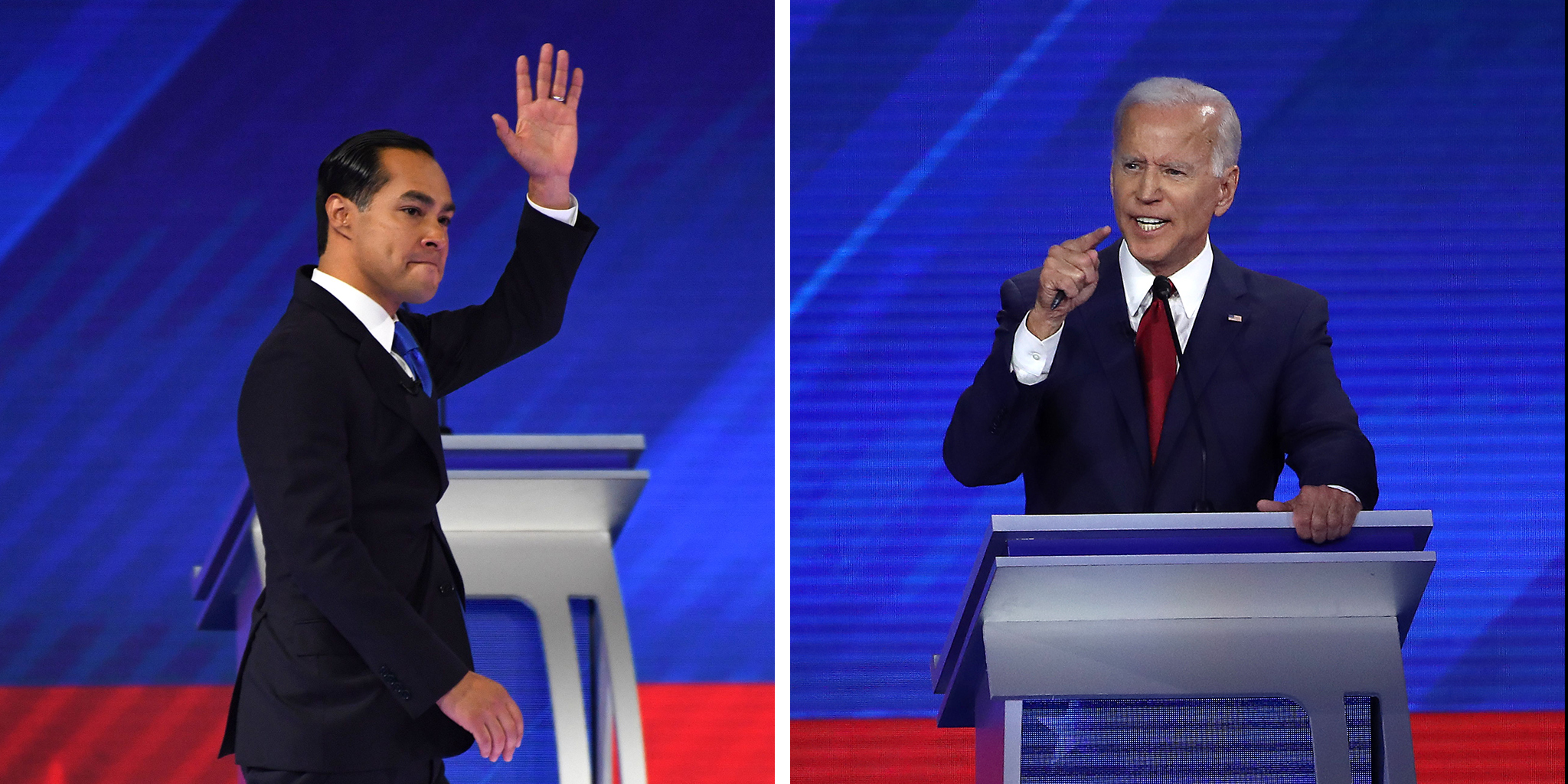
The main difference between their proposals is whether or not all Americans would be automatically enrolled in the public healthcare option. Castro claimed that Biden’s plan wouldn’t cover Americans who lost their jobs, as they would not already be enrolled — something Biden said was untrue.
“Barack Obama’s vision was not to leave ten million people uncovered — he wanted every single person in this country covered. My plan would do that, your plan would not,” Castro said. Biden denied that claim, asserting that Americans don’t have to “buy in” to be covered by his healthcare plan.
But Castro thought his former colleague was going back on his word. “I can’t believe that you said two minutes ago that they had to buy in, and now you’re saying that they don’t have to buy in,” he said. “You’re forgetting that.”
Protesters briefly disrupt Biden during debate
During the third Democratic presidential primary debate, protesters interrupted former Vice President Joe Biden during an answer about the most significant personal setback he’s ever faced.
Although it was difficult to decipher what the protesters were saying, multiple accounts said the group was chanting about the Deferred Action for Childhood Arrivals (DACA).
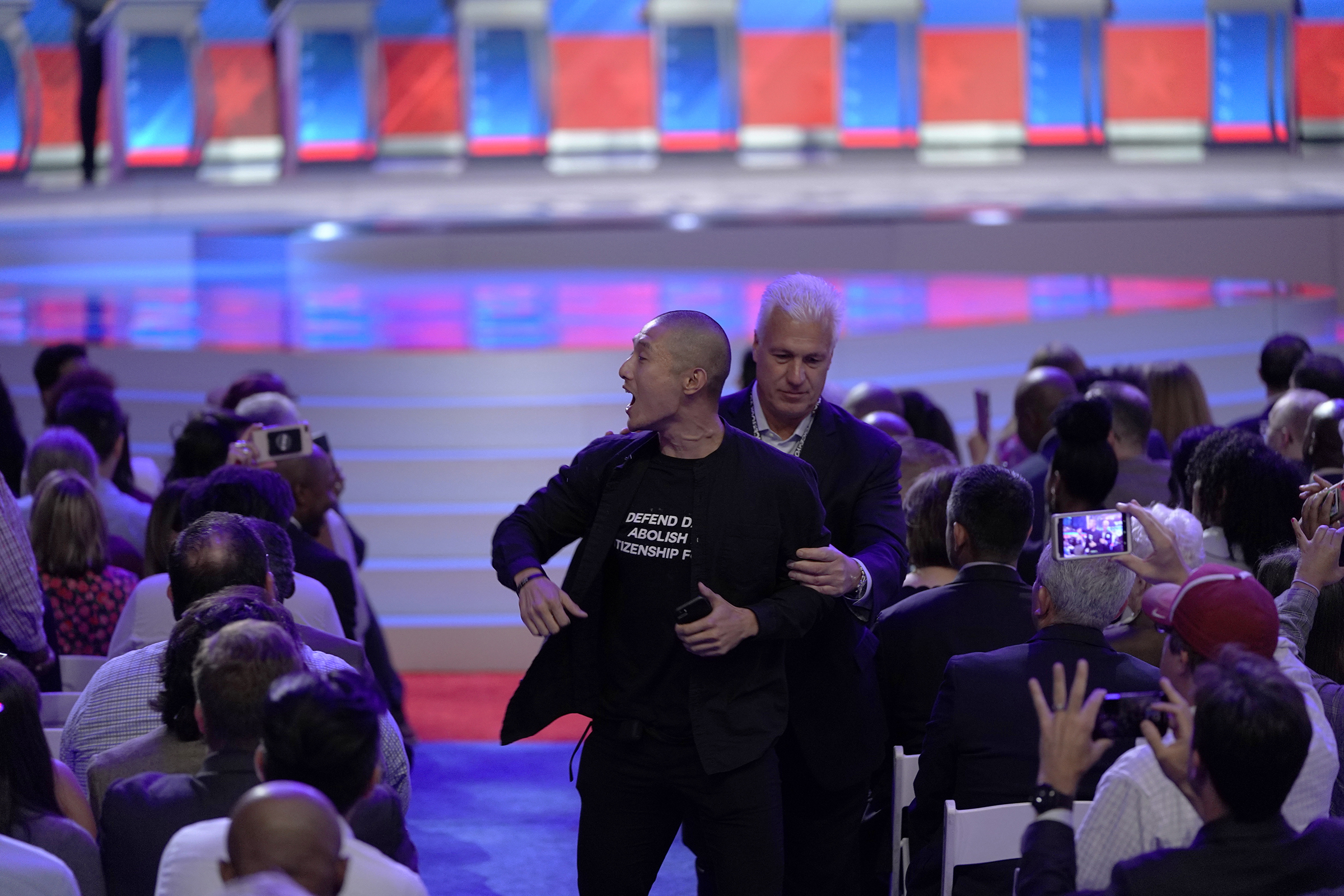
Jess Davidson, the executive director of the advocacy organization End Rape on Campus, confirmed to TIME that the protesters were yelling “we are DACA recipients. Our lives are at risk,” as she also shared on Twitter. She also confirmed that some of the protesters were escorted out after they went on stage.
This is the second time protestors have interrupted a presidential primary debate. In July, protestors interrupted CNN’s debate in Detroit by protests about immigration and the New York City police department.
Candidates address gun control
With the debate taking place just weeks after the El Paso and Dayton mass shootings, gun control was an issue many candidates spoke about passionately.
Muir directed a pointed question toward former V.P. Biden, asking if he couldn’t pass gun control after 20 children died in the Sandy Hook tragedy, why should voters give him another chance.
Biden argued that he had “got it done before,” having brought the 1994 Brady Bill into law, which mandated federal background checks on firearm purchases. He also praised O’Rourke for his actions after his hometown of El Paso experienced a white supremacist mass shooting on Aug. 3, killing 22 people and injuring 24. Biden commended him for the way he was able “to look in the eyes of those people, to see those kids, to understand those parents, to understand the heartache.”
Biden and Harris also debated whether the President should have the constitutional ability to issue an executive order to eliminate assault weapons.
Harris also laid blame for the El Paso shooting partially at President Trump’s feet, saying that although “he didn’t pull the trigger, he’s certainly been tweeting out the ammunition.”
O’Rourke also explained why he supports requiring Americans to turn over AR-15 and AK-47 style rifles, while other candidates instead support a voluntary buyback. He argued that they are instead weapons of war. “Hell yes, we’re going to take your AR-15, your AK-47. We’re not going to allow it to be used against our fellow Americans anymore.”
Harris’ awkward Wizard of Oz moment
Sen. Kamala Harris invoked a classic movie to deliver a crack against Donald Trump, derisively comparing the President to the titular wizard of The Wizard of Oz during Thursday’s debate.
While talking about the U.S.-China trade war, Harris spoke about how the U.S. needs to hold China “accountable,” but also needs to work cooperatively with the county.
“We also need to partner with China on the issue of North Korea,” she said. “But the bottom line is this: “Donald Trump, in office on trade policy, you know he reminds me of that guy in The Wizard of Oz, you know, when you pull back the curtain … it’s a really small dude?”
“Okay,” moderator George Stephanopoulos, who is reportedly 5’5,” responded with a brief chuckle. “I’m not even gonna take the bait, Senator Harris.”
“Ah George, it wasn’t about you,” Harris said, continuing to laugh as Sanders began to answer the question about trade.
It wasn’t the first time Harris made the connection. Speaking to CNN after July’s debate in Detroit, she said that President Trump reminded her of the Wizard of Oz. “You pull back the curtain and there’s this really small guy there,” she said at the time.
Candidates go back and forth on health care
The debate began with fiery exchanges over healthcare. Biden, Sanders and Warren, the top three polling candidate, sparred over Sanders’ Medicare for All bill, which Warren also supports. Other candidates, including Klobuchar and Buttigieg, also took aim at the bill, arguing it didn’t allow Americans to keep insurance plans that they like.
Biden began the exchange by saying Sanders and Warren’s Medicare for All push is unrealistic. The former Vice President said he instead supports expanding Obamacare, and said his healthcare plan costs $740 billion dollars — not the $3.4 trillion dollars a year he attributed to Medicare for All, which he says is “twice what the entire federal budget is.”
In response, Warren countered that under Medicare for All “costs are going to go up for wealthier individuals and costs are going to go up for giant corporations.” She added, “But for hardworking families across this country, costs are going to go down.”
Sanders then responded that while that taxes will go up, all out-of-pocket expenses will go down.
Biden then shot back that Sanders “hasn’t answered the question,” and argued that under his plan people would be able to stay on their insurance plan if they like it.
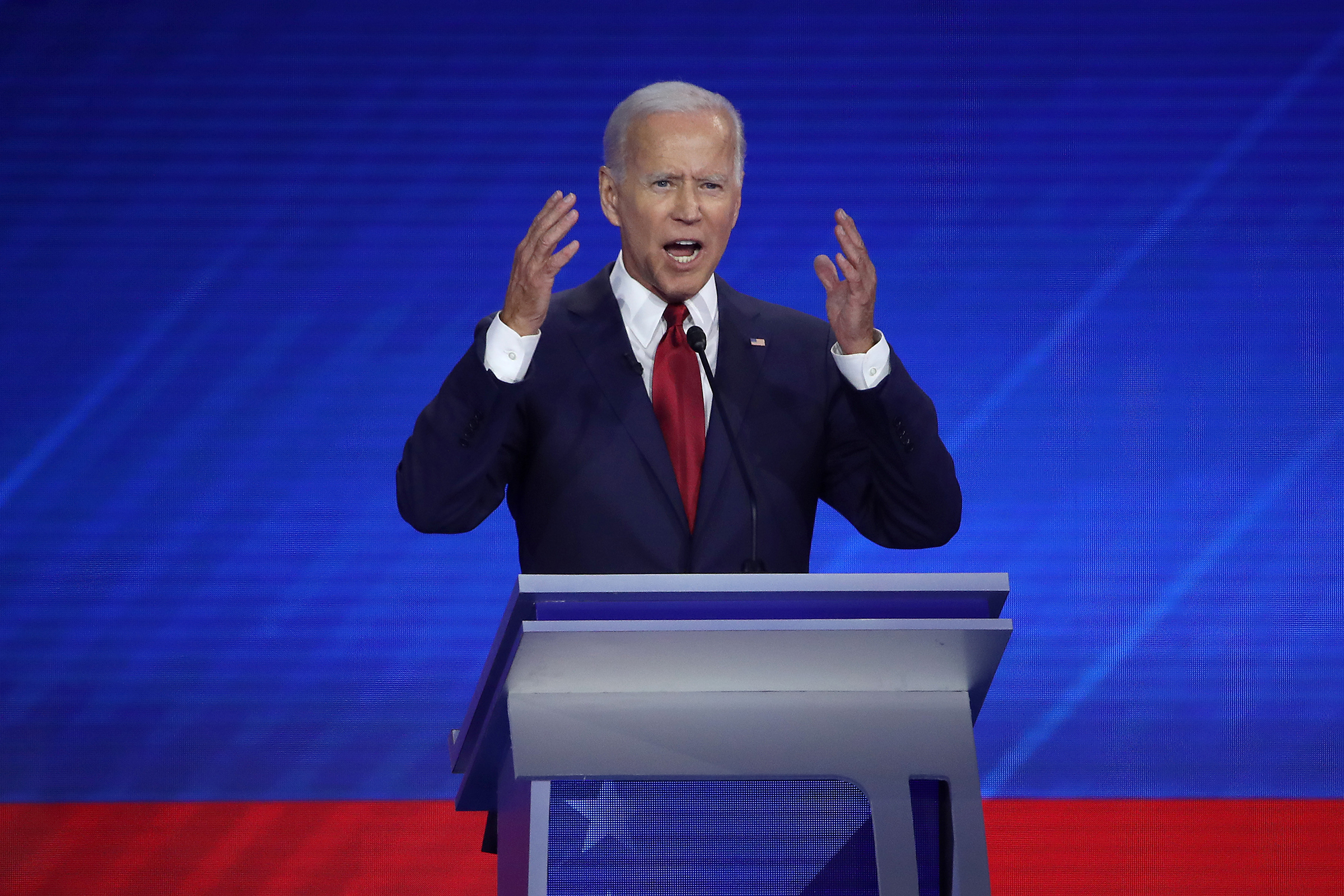
Warren then responded that she had “actually never met anyone that likes their health insurance company,” adding that “what they want is access to healthcare.”
Sen. Amy Klobuchar, a more moderate candidate, also lashed out at Sanders over his Medicare for All bill. Pivoting off the Vermont Senator’s statement that he “wrote the damn bill,” she said that “while Bernie wrote the bill, I read the bill,” and argued that 149 million Americans wouldn’t be able to keep their current insurance under his plan.
Warren responded that people would still have their doctors. “What this is about is making sure that we have the most efficient way possible to pay for health care for everyone in this country.”
Buttigieg also took aim at the Medicare for All bill, saying that the problem is it “doesn’t trust the American people.” He proposed having a public option, and the 150 million people who have private insurance can decide for themselves if they want to keep their health insurance.
Sanders responded that 50 million of those people lose their private insurance every year, and fall through loopholes that his proposal would close.
Candidates weigh in on trade
Stephanopoulos also asked the candidates about President Trump’s trade war with China. He asked Yang if he would repeal the tariffs on his first day, and if so, would he risk “losing leverage” in the U.S.’s trade relationship with China.
Yang said he wouldn’t repeal the tariffs on day one, but he “would let the Chinese know that we need to hammer out a deal.” He said the tariffs are “pummeling” producers and farmers who have nothing to do with the U.S.’s imbalances with China.
When asked about the trade war, Buttigieg said Trump “has no strategy,” and that he hasn’t followed through on his commitment to make a deal with Chinese President Xi Jinping. He warned that the world notices the U.S.’s inability to follow through on its plan — and takes note.
When asked if he would repeal them, the mayor said he would have “a strategy that would include the tariffs as leverage, but it’s not about the tariffs.”
Stephanopoulos also directed the issue to Klobuchar, saying that she has actually supported the tariffs on steel. The Minnesota senator responded that what the U.S. has right now is not a “focused tariff on steel.” She said Trump’s current tariffs have been dangerous and costly, and she instead suggests going back to the negotiating table, and not have a trade policy that changes as rapidly as Trump’s does.
Castro said he would “immediately” begin negotiations with China to ratchet down the trade war, saying the U.S. has “leverage” in that discussion.
Warren argued that the U.S.’s trade policy has been broken “for decades” because it works for “giant multinational corporations and not for much of anyone else.”
She argued that corporations have shaped trade policy for years, and she wants to start to negotiate with unions, small farmers, environmentalists, and human rights activists also “at the table.” She also addressed Castro’s point that the U.S. has “leverage,” saying they can use that leverage to make other countries raise their human rights and environmental standards if they want to enter American markets.
Harris also weighed in, and moved to differentiate herself by saying she is “not a protectionist Democrat.”
“Look, we need to sell our stuff,” she continued. “That means we need to sell it to people overseas. That means we need trade policies that allow that to happen.”
Sanders drew attention back to his differences with the former Vice President, saying he and Biden strongly disagree on trade. Sanders also agreed with Warren that the U.S. has had “disastrous trade policies” for decades.
Yang announced a plan to give $10,000 to 10 families
Tech entrepreneur Andrew Yang announced during his opening remarks a plan to give $1,000 a month to 10 American families. But campaign-finance experts tell TIME the plan may not be compliant with campaign-finance laws.
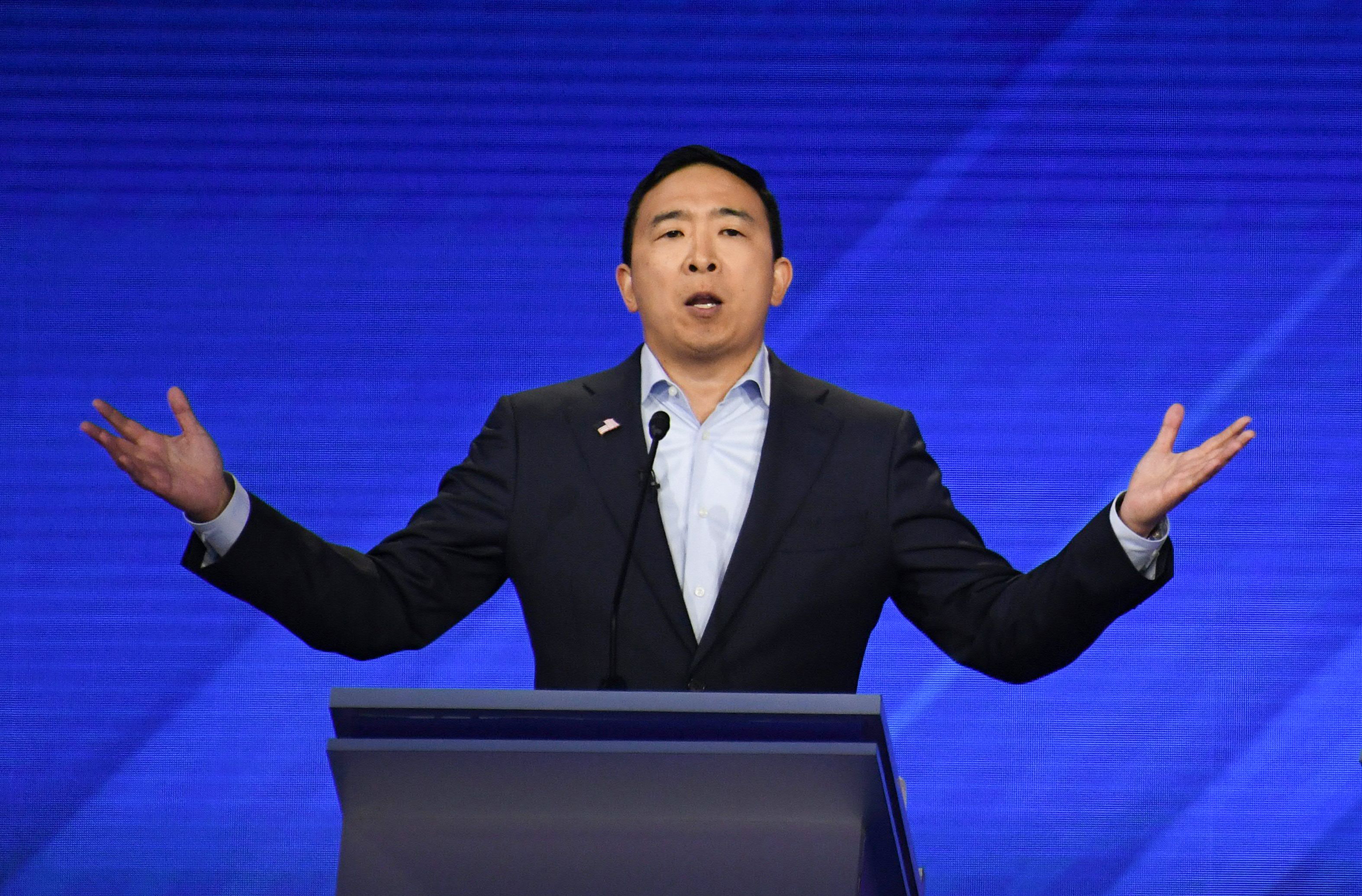
Candidates delivered opening statements
Many of the candidates used their opening statements make the case that they’ll be able to bring Americans together and enact major changes — presuming they win the election. Kicking off the debate, Julian Castro set the tone for the introductions, declaring that a Democrat will be replacing the President in 2021, reminding the audience, “There will be life after Donald Trump.”
Several candidates argued that while Trump has divided the country, they will work to cultivate unity. South Bend, Ind., Mayor Pete Buttigieg said that the anniversary of 9/11 reminded him of another date – Sept. 12, 2001; the date, he says, when Americans “came together. Imagine if we had been able to sustain that unity.”
Biden declared that replacing the President would pave the way for advancement, including investing in medical science and fighting climate change.
“There’s enormous, enormous opportunities once we get rid of Donald Trump,” Biden said.
Harris declared that she wanted to speak directly to Donald Trump, whom she said was likely watching the debate.
“President Trump, you spent the past four years sowing hate and division among us, and that’s why we got nothing done,” she said.
How are the candidates polling?
According to RealClearPolitics’s national polling average on Sept. 12, the candidates in the debate have the following polling averages:
Who was not on stage?
Three presidential candidates had met the donor requirements but hadn’t quite made the polling threshold by the deadline: Hawaii Rep. Tulsi Gabbard, self-help author Marianne Williamson and billionaire executive Tom Steyer, who had qualified in three of four required polls.
Seven candidates met none of the requirements: Colorado Sen. Michael Bennet; Montana Gov. Steve Bullock; New York, N.Y., Mayor Bill de Blasio; Former Maryland Rep. John Delaney; Miramar, Florida, Mayor Wayne Messam; Ohio Rep. Tim Ryan and Former Pennsylvania Rep. Joe Sestak.
Seven candidates have dropped out of the race: Former Alaska Sen. Mike Gravel, former West Virginia state senator Richard Ojeda, Former Colorado Gov. John Hickenlooper, Washington Gov. Jay Inslee, Massachusetts Rep. Seth Moulton, California Rep. Eric Swalwell and New York Sen. Kirsten Gillibrand, who dropped out on Aug. 28 after facing the likelihood that she would not qualify for the third debate.
More Must-Reads from TIME
- Cybersecurity Experts Are Sounding the Alarm on DOGE
- Meet the 2025 Women of the Year
- The Harsh Truth About Disability Inclusion
- Why Do More Young Adults Have Cancer?
- Colman Domingo Leads With Radical Love
- How to Get Better at Doing Things Alone
- Michelle Zauner Stares Down the Darkness
Write to Madeleine Carlisle at madeleine.carlisle@time.com, Abby Vesoulis at abby.vesoulis@time.com and Rachel E. Greenspan at rachel.greenspan@time.com
